Highlighting UAA Research & Creative Activities: DEI in the Classroom and Beyond
Highlighting UAA Research & Creative Activities: DEI in the Classroom and Beyond
Date: March 25, 2022
Time: 10:00 AM - 12:00 PM
Location: Zoom
Agenda
| Time | Topic | Presenter(s) |
| 10:00 AM | Opening & Welcome | Andre Rosay |
| 10:05 AM |
Panel: Alaska Native Voices on Research |
Jessica Sanigaq Ullrich (Facilitator) |
| 10:55 AM | Break | |
| 11:00 AM | Report on Survey on Research Involving Diversity, Equity, and Inclusion | |
| 11:15 AM | Panel: “What inspires one to do research?” There is a growing body of research that explores issues related to diversity, equity and inclusion. What does DEI in research look like at UAA? Join us as we invite researchers to discuss their projects, what inspires their work and its impact to UAA and the community as a whole. |
Lynda Hernandez (Facilitator) |
| 12:00 PM | Adjournment |
Session Recording
Speaker Bios

Andre B. Rosay is a Professor of Justice and the Interim Dean for the College of Health at the University of Alaska Anchorage. His research focuses on gender-based violence, in particular violence against American Indian and Alaska Native women and men. He has tremendous experience working with practitioners and tribal communities to conduct community-based participatory research that influences policy and practice. He was a Visiting Executive Research Fellow in the Office of Research and Evaluation at the National Institute of Justice (NIJ). Under this fellowship, Dr. Rosay worked on NIJ’s program of research on violence against Indian women living in tribal communities. Dr. Rosay’s most recent publication focuses on anti-racist and intersectional approaches in social science and community-based research.
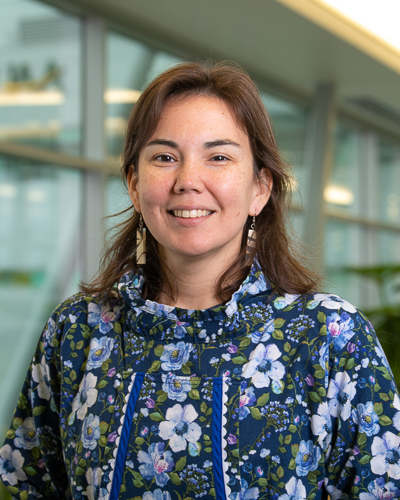
Jessica Saniguq Ullrich is an Inupiaq scholar, a tribal citizen of Nome Eskimo Community and a descendant of the Native Village of Wales. As an Assistant Professor at the University of Alaska Anchorage in the School of Social Work, she focuses on the promotion of connectedness, wellbeing and relational healing. Jessica is currently engaged in efforts that involve digital storytelling with Alaska Native youth, culturally-based curriculum development, tribal child welfare prevention efforts, language revitalization and connectedness for systems change. Storytelling through research, education, and authorship is central to her work.
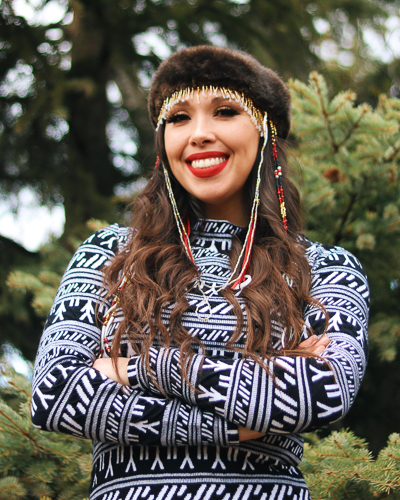
Haliehana Alaĝum Ayagaa Stepetin
Haliehana Alaĝum Ayagaa Stepetin is Unangax̂ from the Qigiiĝun Tribe and was born and raised in her homelands/waters in the village of Akutan, Alaska. She weaves together her transdisciplinary experience deeply shaped by the Unangax̂ subsistence cosmology she was raised within as an artist and scholar, Unangax̂ dancer, choreographer, performance artist, poet, and activist. Haliehana is a PhD Candidate in Native American Studies at the University of California Davis with a designated emphasis in Studies in Performance and Practice. She has a Master of Arts in Cultural Studies from the University of Washington Bothell (2018) and a Bachelor of Arts in International Studies with a concentration on Russia (2016) from the University of Alaska Anchorage, where she serves as Instructor of Alaska Native Studies. Her research engages Native North Pacific perspectives on food sovereignty and environmental justice in dialogue with Unangax̂ subsistence performance(s) and sustainability protocols as interventions to the ongoing climate crisis.
Dr. Maria Shaa Tláa Williams was born in Tikahtnu, or Anchorage, Alaska, and is Tlingit. She is of the Raven Moiety, Deishetaan clan. She received my M.A. and PhD in Music, specializing in Ethnomusicology from UCLA. The title of her M.A. Thesis is: Clan Identification and Social Structure in Tlingit Music (1989) and the title of the dissertation is Alaska Native Music: The Spirit of Survival (1996). Dr. Williams was a Ford Foundation Postdoctoral Fellow in 1998 and researched surviving ceremonial music/dance in Alaska. She taught at the Institute for American Indian arts from 1993-1995, and at the University of New Mexico from 1999-2011 with a joint appointment in the department of Native American Studies and Music. She moved home in 2011 and has been teaching at the University of Alaska Anchorage since 2011 in the departments of Alaska Native Studies and Music, where she is a full professor.
Dr. Williams' publications include The Alaska Native Reader: History, Culture & Politics (2009); a documentary film on Athabascan Basket maker Daisy Stridzatze Demientieff (A Beautiful Journey 2009), and various articles on Alaska Native cultural revitalization. Her research interests include contemporary Alaska Native music and dance practices; Alaska Native history, the impact of colonialism and cultural revitalization.
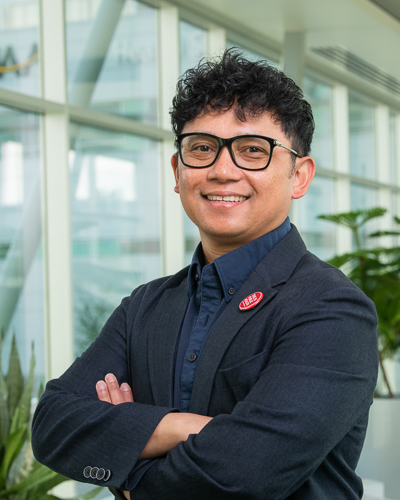
Dr. Garcia is a Philippine-born, Alaska-grown, Professor of Public Health at University of Alaska Anchorage (UAA). He is also the Coordinator of UAA’s Master of Public Health Program. Dr. Garcia was the recipient of the Alaska Public Health Association’s “Short Term Service Award” in 2002 and “The Barbara Berger Excellence in Public Health Award” in 2012. At UAA, Dr. Garcia has been awarded the Chancellor’s Award for Excellence in Community Service, Chancellor’s Award for Excellence in Diversity, and the Center for Community Engagement & Learning’s Community Builder Award. Dr. Garcia, along with a group of UAA faculty and students, were awarded the UAA’s Stewardship Award in 2014 and American Lung Association in Alaska’s Breathe Easy Champion Award in 2015 for the group’s successful effort in making the University of Alaska system smoke and tobacco-free. In 2015, Dr. Garcia was appointed as one of the health commissioners of the Anchorage Health Department. Dr. Garcia’s research interests include health promotion and disease prevention, tobacco prevention and control, Asian and Pacific Islander health, and issues related to social determinants of health. He teaches courses in research methods, program evaluation, and health communications. More recently, Dr. Garcia has been involved in helping with the prevention and mitigation of COVID in the Municipality of Anchorage and the state through his research and evaluation.
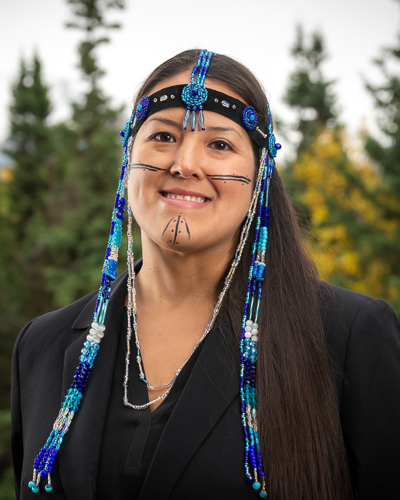
Dr. Michele Yatchmeneff is an Unangax̂ woman who grew up living a traditional subsistence lifestyle in rural villages of King Cove and False Pass, along Alaska's Aleutian chain. She has worked at University of Alaska Anchorage since 2007, and as faculty since 2015 and was promoted to Associate Professor of Engineering this past summer. She has committed her career on improving Alaska Native success and was just hired to serve on UAA’s Chancellor’s cabinet in an inaugural position as Executive Director for Alaska Native Education and Outreach. Michele was, herself, an Alaska Native Science and Engineering Program (ANSEP) Scholar at the University of Alaska Anchorage, where she earned a BS in Civil Engineering in 2005 and an MS in Engineering Management in 2009. After earning her BS, she began working in Alaska's construction and engineering industry, specializing in water and sewer projects in remote villages across the state. She also served as ANSEP Deputy Director from 2007 to 2012.
Professor Yatchmeneff went on to her PhD in Engineering Education from Purdue University,
focusing on motivation and success of pre-college Alaska Native STEM students. Her
current research expands that doctoral work to focus on belongingness, Alaska Native
education, preparation, and retention. In 2018, Michele received the prestigious National
Science Foundation CAREER Award, honoring her work on “Alaska Native Belonging in
High School Math
and Science Classrooms.”
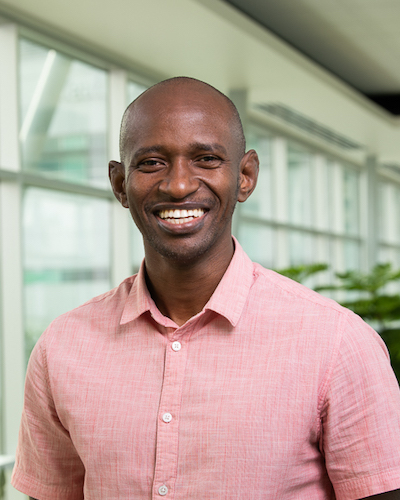
Amana Mbise is an Assistant Professor of social work in the School of Social Work, College of Health, at the University of Alaska Anchorage. He has vast experiences in global health (HIV/AIDs and Malaria), refugee integration, and community development in Tanzania, Denmark, and the U.S.A. His scholarship centers on migration, human trafficking, and rights-based approaches to social work. Amana’s on-going and most recent works include an NIJ study on labor exploitation in Alaska and a Department of State funded grant to estimate the prevalence of human trafficking for domestic servitude in Tanzania. Currently, Amana is working with the Alaska Black Caucus to conduct the first health needs assessment for Black-Identifying Alaskans.
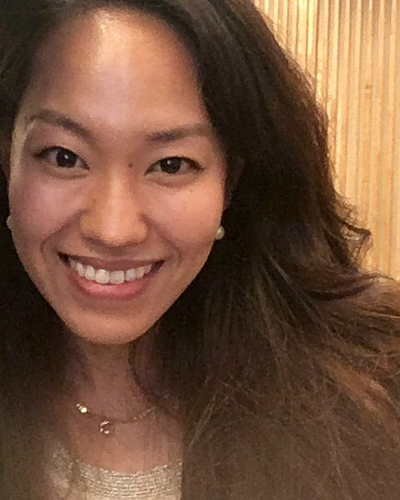
Rei is an Assistant Professor at the University of Alaska Anchorage School of Social Work. She holds a Master of Social Work from Columbia University School of Social Work and a doctorate from New York University Silver School of Social Work. Rei's research aims to understand how psychosocial determinants of health such as poverty, mental health, and interpersonal relationship dynamics influence food-related decision-making and dietary outcomes among low-income young adults. Her research is inspired by the relational food narratives she encountered in her clinical work, providing trauma-focused therapy to those impacted by domestic violence (DV) in the United States and Japan. Her overarching professional goal is to expand the presence of social workers in developing, implementing, and testing community-based nutrition interventions using strategies that highlight resilience rather than deficits to mitigate dietary disparities and resulting health outcomes. She further hopes that social work research examining food behaviors through an equity lens can influence social welfare policies to promote universal access to nutritious food. She has also continued her involvement in DV research by examining the efficacy of court-mandated batterer intervention programs with a specific focus on restorative justice, promoting food as a vehicle of dialogue to address relational conflicts.
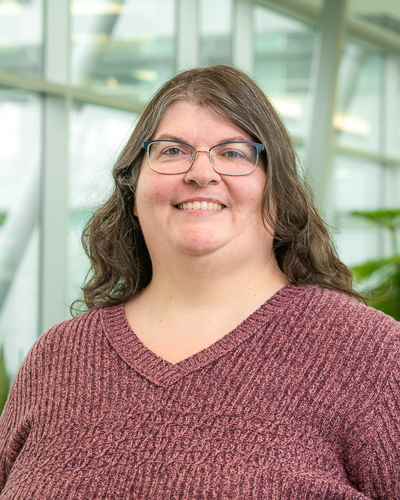
Sharon Chamard is a Professor of Justice at the Justice Center in the College of Health at the University of Alaska Anchorage. She grew up in Halifax, Nova Scotia, and received her M.A. and Ph.D. in Criminal Justice from Rutgers University-Newark. Her main interest since beginning graduate school has been the interaction between the built environment and human behavior—crime in particular. A related interest is problem-oriented policing. Since moving to Anchorage nearly 20 years ago and getting very involved in the Fairview Community Council and other community activities, her focus has grown to include homelessness, and more recently, climate change and how it is likely to affect urban communities in the sub-Arctic. She was a member of the Municipality of Anchorage Public Safety Advisory Commission for sixteen years and currently serves as the chair of the Data Committee of the Anchorage Coalition to End Homelessness Advisory Council and as an advisor to the NeighborWorks Alaska Community Development committee. She has published on the topics of homeless encampments and community-based approaches to addressing crime and other social issues.









